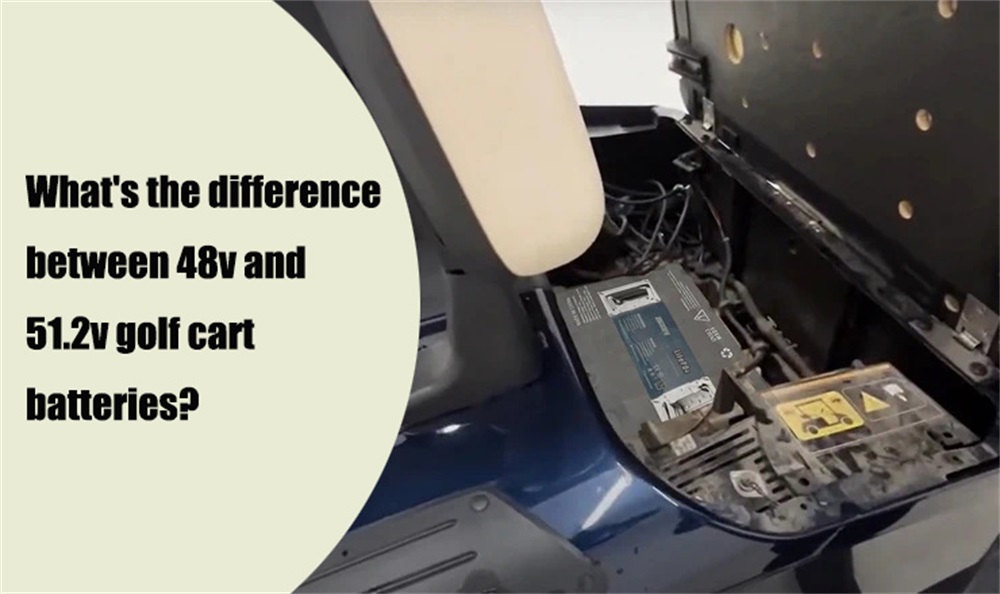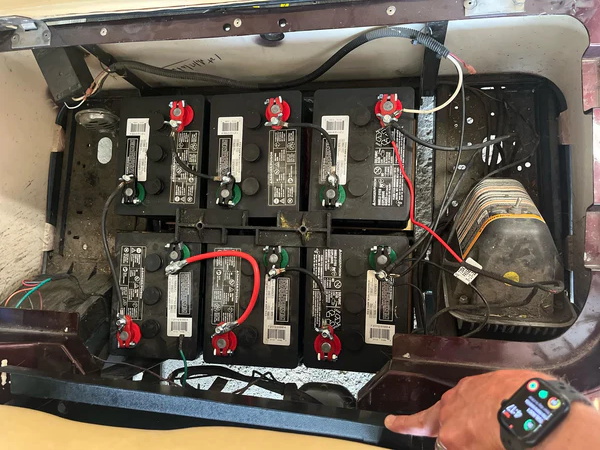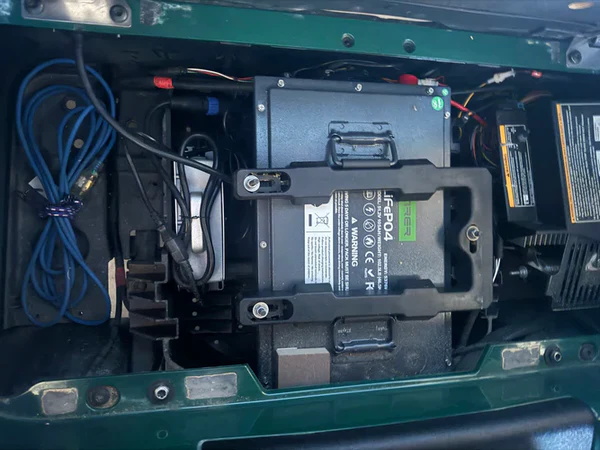What's the Difference Between 48V And 51.2V Golf Cart Batteries?

Golf carts are widely used in golf courses, resorts, and other low-speed electric vehicles. We have some clients, As Golf cart owners and fleet managers are often faced with a choice: stick with the traditional 48V batteries or upgrade to the slightly higher voltage 51.2V batteries? and what's the difference between 48v and 51.2v golf cart batteries? So In this blog post, we'll explore the differences between these two voltage options, and help relevant customers choose a golf cart battery that suits their needs.
First, we should understand what 48V and 51.2V golf cart batteries are.
48V Golf Cart Batteries
A 48V battery system typically uses lead-acid or AGM (Absorbed Glass Mat) batteries. This voltage has been the standard for many golf carts due to its ability to provide sufficient power for most recreational needs.
Voltage Range: A standard 48V battery pack operates within 42V to 50V during use.
Battery Chemistry: Most 48V systems use lead-acid batteries, which are affordable but have limited efficiency and shorter lifespans.
Applications: Ideal for traditional golf carts on flat terrains or short distances.

51.2V Golf Cart Batteries
The 51.2V systems are generally lithium-based, specifically using LiFePO4 battery cell. These batteries are becoming increasingly popular due to their superior performance and longevity.
Voltage Range: A 51.2V battery operates from 48V to 54V.
Battery Chemistry: They use advanced LiFePO4 technology, offering higher energy density and stability.
Applications: Perfect for modern golf carts that require enhanced performance, long-distance capabilities, and reliability.

48v golf cart batteries have been the industry standard for many years. These batteries are known for their wide availability, especially in lead-acid form. Most older golf cart models rely on 48V systems, making them a familiar choice for golf cart owners. 48v golf cart batteries have been around for a long time, are easy to find replacement parts, are compatible with a variety of golf cart owners, So although 48v golf cart batteries have some drawbacks, they are still very popular.
51.2V Golf batteries are relatively new to the market as golf batteries, using lithium-ion technology and based on lithium batteries, which are becoming more and more popular due to higher voltage, higher efficiency and better overall performance. The higher voltage of 51.2v golf cart batteries provides improved power output, meaning golf carts equipped with these batteries can handle more challenging terrain or heavier loads with greater ease.
Performance Comparison Between 48V and 51.2V Golf Cart Batteries
Power Output
48V Batteries: Provide standard power for typical golf carts, suitable for everyday use and normal terrain.
51.2V Batteries: Offer higher power, resulting in better acceleration, higher speeds, and improved hill-climbing.
Efficiency
48V Batteries: Efficient for standard use but may decline over time with lower energy density.
51.2V Batteries:Higher efficiency and energy density, with more consistent power and fewer energy losses.
Acceleration and Speed
48V Batteries: Adequate for everyday use, suitable for casual driving and standard golf course conditions.
51.2V Batteries: Provide faster acceleration and higher top speeds, offering a more responsive driving experience.
Battery Life
48V Batteries: Shorter lifespan (2-3 years) with more frequent maintenance.
51.2V Batteries: Longer lifespan (5+ years), superior durability, and less maintenance.
Weight
48V Batteries: Heavier due to more lead-acid cells, affecting cart handling.
51.2V Batteries: Lighter with lithium-ion cells, improving handling and efficiency.
Charging Time
48V Batteries: Take longer to charge.
51.2V Batteries: Charge faster due to lithium-ion technology, enabling quicker turnarounds.
Cost
48V Batteries:Lower initial cost but higher maintenance and shorter lifespan.
51.2V Batteries: Higher upfront cost but lower maintenance, longer lifespan, and better long-term value.
Can You Convert a 48V Golf Cart Battery to a Lithium Battery?
Yes, converting a 48V golf cart battery to a lithium battery is possible and offers several benefits, including extended lifespan, minimal maintenance, and reliable performance. ——48V golf cart LiFePO4 battery
However, before switching to a 51.2V lithium battery, ensure your golf cart’s motor and controller are compatible. Some older models may require adjustments or upgrades to handle the increased efficiency and power of lithium batteries.
Additionally, check your charger compatibility. Most lithium batteries require a specific charger for optimal performance and longevity.
Choosing Between 48v and 48v (51.2v) Golf Cart Batteries
Selecting the right battery system for your golf cart ultimately depends on your specific needs, budget, and how you plan to use your vehicle. Both 48v golf cart batteries and 48v (51.2v) golf cart lithium battery systems have their strengths and weaknesses, and understanding these differences can help you make an informed decision.
48v Golf Cart Batteries: If you’re looking for a cost-effective solution and don’t mind the added maintenance, lead-acid 48v golf cart batteries could be the right choice. They are readily available, affordable, and compatible with most older golf cart models. However, be prepared for regular upkeep and the potential need for replacements every few years.
48v (51.2v) Golf Cart Lithium Battery: For those who value long-term savings, superior performance, and low maintenance, investing in a 48v (51.2v) golf cart lithium battery system is the better option. Although the initial cost is higher, the benefits of lithium technology—such as increased range, faster charging, and longer lifespan—make it a worthwhile investment for frequent users or those seeking convenience.
When deciding between lead-acid 48v golf cart batteries and 48v (51.2v) golf cart lithium battery systems, consider your driving habits, budget, and the golf cart’s specific requirements. Evaluating the pros and cons of each option will allow you to make an informed decision based on your unique needs.

